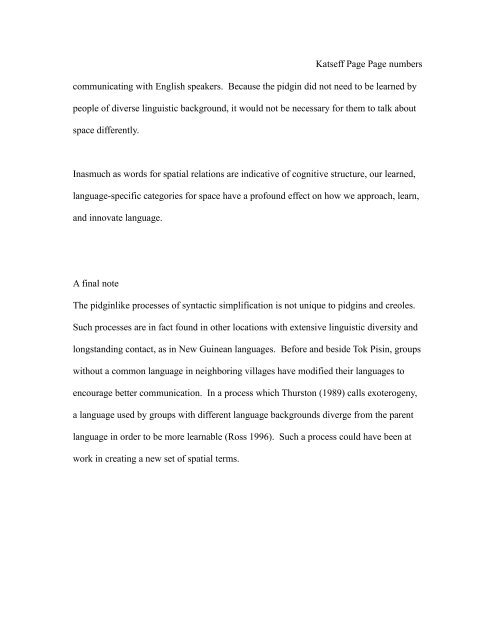The case of pidgin and creole languages - Linguistics
The case of pidgin and creole languages - Linguistics
The case of pidgin and creole languages - Linguistics
Create successful ePaper yourself
Turn your PDF publications into a flip-book with our unique Google optimized e-Paper software.
Katseff Page Page numbers<br />
communicating with English speakers. Because the <strong>pidgin</strong> did not need to be learned by<br />
people <strong>of</strong> diverse linguistic background, it would not be necessary for them to talk about<br />
space differently.<br />
Inasmuch as words for spatial relations are indicative <strong>of</strong> cognitive structure, our learned,<br />
language-specific categories for space have a pr<strong>of</strong>ound effect on how we approach, learn,<br />
<strong>and</strong> innovate language.<br />
A final note<br />
<strong>The</strong> <strong>pidgin</strong>like processes <strong>of</strong> syntactic simplification is not unique to <strong>pidgin</strong>s <strong>and</strong> <strong>creole</strong>s.<br />
Such processes are in fact found in other locations with extensive linguistic diversity <strong>and</strong><br />
longst<strong>and</strong>ing contact, as in New Guinean <strong>languages</strong>. Before <strong>and</strong> beside Tok Pisin, groups<br />
without a common language in neighboring villages have modified their <strong>languages</strong> to<br />
encourage better communication. In a process which Thurston (1989) calls exoterogeny,<br />
a language used by groups with different language backgrounds diverge from the parent<br />
language in order to be more learnable (Ross 1996). Such a process could have been at<br />
work in creating a new set <strong>of</strong> spatial terms.

















